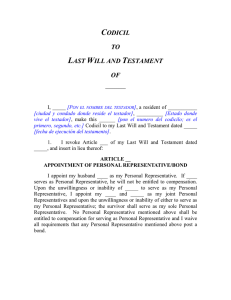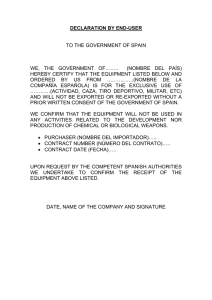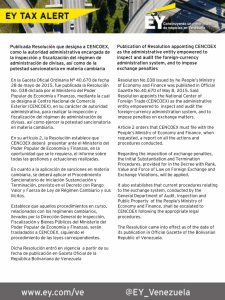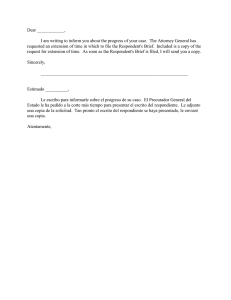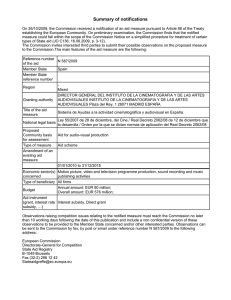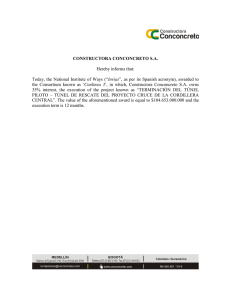INTERVENCIÓN DEL SEE EN LA CONFERENCIA DEL COMITÉ
Anuncio
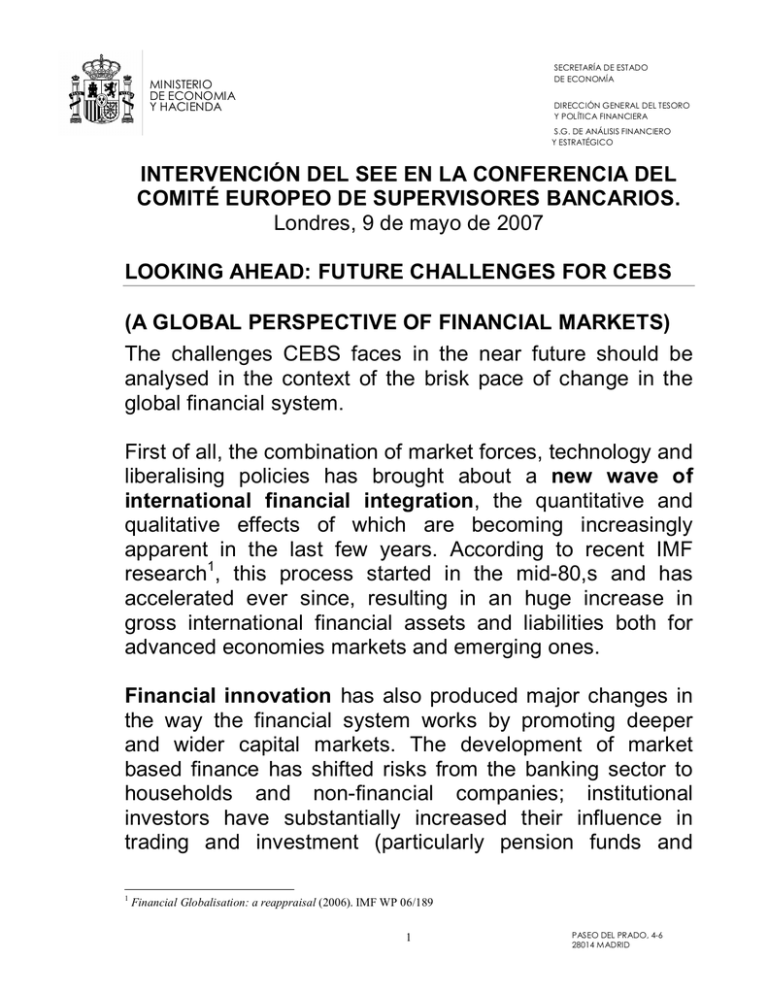
SECRETARÍA DE ESTADO DE ECONOMÍA MINISTERIO DE ECONOMIA Y HACIENDA DIRECCIÓN GENERAL DEL TESORO Y POLÍTICA FINANCIERA S.G. DE ANÁLISIS FINANCIERO Y ESTRATÉGICO INTERVENCIÓN DEL SEE EN LA CONFERENCIA DEL COMITÉ EUROPEO DE SUPERVISORES BANCARIOS. Londres, 9 de mayo de 2007 LOOKING AHEAD: FUTURE CHALLENGES FOR CEBS (A GLOBAL PERSPECTIVE OF FINANCIAL MARKETS) The challenges CEBS faces in the near future should be analysed in the context of the brisk pace of change in the global financial system. First of all, the combination of market forces, technology and liberalising policies has brought about a new wave of international financial integration, the quantitative and qualitative effects of which are becoming increasingly apparent in the last few years. According to recent IMF research 1 , this process started in the mid­80,s and has accelerated ever since, resulting in an huge increase in gross international financial assets and liabilities both for advanced economies markets and emerging ones. Financial innovation has also produced major changes in the way the financial system works by promoting deeper and wider capital markets. The development of market based finance has shifted risks from the banking sector to households and non­financial companies; institutional investors have substantially increased their influence in trading and investment (particularly pension funds and 1 Financial Globalisation: a reappraisal (2006). IMF WP 06/189 1 PASEO DEL PRADO, 4­6 28014 MADRID SECRETARÍA DE ESTADO DE ECONOMÍA MINISTERIO DE ECONOMIA Y HACIENDA DIRECCIÓN GENERAL DEL TESORO Y POLÍTICA FINANCIERA S.G. DE ANÁLISIS FINANCIERO Y ESTRATÉGICO hedge funds) and the credit derivatives market has consolidated in a few years as a major OTC market. Finally, as financial markets have gained in complexity and importance financial stability has become a core goal of economic policy. The crises and disruptions of the 1990´s showed that a liberalised and more integrated financial system could be prone to instability. The interaction of powerful capital markets and weak banking systems has the potential to wreak havoc in the economy. Policy makers around the world realised that the institutional infrastructure had to be improved to ensure that financial systems are able to perform their vital economic tasks (allocation of resources across time and space, management and pricing of risks) as well as to absorb shocks 2 . As a result of these reflections financial supervision and financial management have become risk­oriented, adapting their working framework to this new sophisticated scenario. It soon appeared as evident that in order to be effective this policy effort should have an international dimension. The greater involvement in financial stability issues by the IMF, the creation of the Financial Stability Forum and the ensuing initiatives to build a set of international standards are good examples of this approach. Perhaps the finest output of this co­operative approach is 2 Definición de estabilidad financiera en Schinasi et al (2004), IMF Working Paper, Junio de 2004. 2 PASEO DEL PRADO, 4­6 28014 MADRID SECRETARÍA DE ESTADO DE ECONOMÍA MINISTERIO DE ECONOMIA Y HACIENDA DIRECCIÓN GENERAL DEL TESORO Y POLÍTICA FINANCIERA S.G. DE ANÁLISIS FINANCIERO Y ESTRATÉGICO Basel II, which will radically improve the economic rationale of prudential supervision. Looking at the macroeconomic and financial performance of the world since the turn of the century, one might conclude that these structural changes are already yielding significant benefits. Volatility and spreads of risky assets have stabilised at record lows and the banking sector is improving its soundness. All in all, it seems that the ability of the global financial system to contribute to the good functioning of the economy through more efficient allocation of savings and enhanced risk diversification is being exploited to a large extent. However, recent disturbances in financial markets have reminded us that “Mr. Market” is always ready to frighten us. Thus, it is better to be cautious and not fall into complacency. The new financial landscape, in spite of its increased efficiency, probably carries new sources of potential instability. Risks are better diversified and pooled; but we have scant information about who is bearing them. The system is more resilient to high probability­low severity shocks; but it might be more vulnerable to low probability events. The inter­dependency of today’s financial system makes it easier for shocks to spread and therefore requires a considerable effort in terms of cooperation among supervisors, regulators and policy makers. 3 PASEO DEL PRADO, 4­6 28014 MADRID SECRETARÍA DE ESTADO DE ECONOMÍA MINISTERIO DE ECONOMIA Y HACIENDA DIRECCIÓN GENERAL DEL TESORO Y POLÍTICA FINANCIERA S.G. DE ANÁLISIS FINANCIERO Y ESTRATÉGICO (THE EUROPEAN FRAMEWORK AND THE ROLE OF CEBS) In the European Union, authorities have reacted to the pace and depth of the above mentioned changes in the financial system by promoting legal as well as structural changes aimed at enhancing the ability of EU financial markets to perform in the new environment. After the creation of a single market for credit institutions and the Eurozone, the more recently successful adoption of the Financial Services Action Plan (FSAP) from 1999 to 2005 has provided a new regulatory framework that will definitely promote the integration process. The introduction of the Lamfalussy architecture has improved the speed and quality of the rule­making process and has encouraged a deeper convergence in supervisory practices and consistency of transpositions. The role of the Level 3 Committees has been of paramount importance in this context and the assessment of their work we can do so far is very encouraging. CESR was pioneer in this architecture and therefore its work has been a reference for the other two committees. CESR’s advice to the European Commission has been crucial in providing the technical basis for the new securities regulatory rulebook, including MIFID, the Transparency Directive, the Prospectus Directive or the Market Abuse Directive, as well as their implementing measures. 4 PASEO DEL PRADO, 4­6 28014 MADRID SECRETARÍA DE ESTADO DE ECONOMÍA MINISTERIO DE ECONOMIA Y HACIENDA DIRECCIÓN GENERAL DEL TESORO Y POLÍTICA FINANCIERA S.G. DE ANÁLISIS FINANCIERO Y ESTRATÉGICO In the last two years it has reoriented its activity to a more intensive work on enhancing convergence of supervisory practices. New tools have been recently established or are in the pipeline in order to make this convergence a reality, such as mediation, delegation, streamlined reporting requirements and data­sharing arrangements. I may stress that, until very recently, most of this work has been developed on CESR´s own initiative; and its achievements are outstanding. CEIOPS has focused its activity on the advice to the Commission, and particularly in the framework of the Solvency II project. But it is also aware of the need to foster supervisory convergence and is already actively seeking to make headway, both at the level of the legislative provisions and with the analysis of new tools. In the banking field, the co­operative framework for supervision has a long standing tradition. Notwithstanding, the creation of CEBS has meant a qualitative leap forward in supervisory convergence. When CEBS started working under the current framework, most of the legislative reform linked to Basel II was already finished thanks, among others, to the intensive work carried out by banking supervisors. Therefore, most of its work since then has been focused on the convergent implementation of the Capital Requirements Directive (CRD). But it is not my intention to summarise here what CEBS has done in the past, which is much and very important. I am 5 PASEO DEL PRADO, 4­6 28014 MADRID SECRETARÍA DE ESTADO DE ECONOMÍA MINISTERIO DE ECONOMIA Y HACIENDA DIRECCIÓN GENERAL DEL TESORO Y POLÍTICA FINANCIERA S.G. DE ANÁLISIS FINANCIERO Y ESTRATÉGICO here to be forward looking and give you my perspective, as chairman of the FSC, about the role of CEBS in our common endeavour of enhancing the efficiency and stability of the European financial system. (FUTURE CHALLENGES FOR CEBS) First of all, I would remark that in 2006 ECOFIN approved the so called Francq Report of the FSC, which included recommendations to the Level 3 Committees aimed at reducing costs of cross­border business and improving convergence and consistency in the day­to day application of the rules. I will now go through these recommendations with some detail. To begin with, the enhancement of a pan­European supervisory culture is required in order to achieve a higher degree of supervisory cooperation and convergence. Some measures such as training programmes, staff exchanges or joint inspections have already been put in place in recent months. But we are at the early beginning of a long journey and much work has to be done in order to let the European approach take root among supervisory national practices. Delegation of tasks between supervisors is also a key tool aimed at optimising the supervision of cross­border institutions through work sharing. This is an evolutionary approach and can reasonably be adapted to the needs of each sector and according to the experience. I therefore consider very positive the initiative of CEBS to elaborate a 6 PASEO DEL PRADO, 4­6 28014 MADRID SECRETARÍA DE ESTADO DE ECONOMÍA MINISTERIO DE ECONOMIA Y HACIENDA DIRECCIÓN GENERAL DEL TESORO Y POLÍTICA FINANCIERA S.G. DE ANÁLISIS FINANCIERO Y ESTRATÉGICO “lessons learned” document from the work conducted within the operational networks 3 . However I still believe that it would be very convenient to develop some home­host guidelines to support further experiences. Ministers also invited Level Three Committees to set up a non­binding mediation mechanism between supervisors in order to resolve supervisory disputes and therefore to promote cooperation. This procedure, which was initially conceived for the securities field, will also find room in the banking sector although, as the FSC suggested, it can be made under a tailor­made approach. I tend to understand the reluctance some banking supervisors showed towards this tool, because in prudential supervision there is always a pressure from the industry to relax the standards. Nonetheless, as it emerged from the FSC discussion, mediation can also be an effective tool to foster convergence in banking, with all the care due to ensure it is not used for inadequate purposes. CEBS has also worked very fruitfully in implementing the FSC Report recommendation on streamlined reporting requirements. It seems that the industry is asking for further progress 4 and I know that CEBS will continue to strive to 3 Esta es una de las iniciativas más ambiciosas de CEBS; consiste en intensificar la cooperación entre los supervisores de los principales grupos con actividad transfronteriza en la UE. 4 CEBS ha elaborado un marco común para remitir información a los supervisores y también para difundir la información al mercado. Pero la industria cree que los progresos son insuficientes, porque no se evita que los requerimientos de los supervisores sean distintos. 7 PASEO DEL PRADO, 4­6 28014 MADRID SECRETARÍA DE ESTADO DE ECONOMÍA MINISTERIO DE ECONOMIA Y HACIENDA DIRECCIÓN GENERAL DEL TESORO Y POLÍTICA FINANCIERA S.G. DE ANÁLISIS FINANCIERO Y ESTRATÉGICO reduce this burden, which is particularly heavy for cross border banks. Let me finally emphasize that the successful and timely implementation of the above mentioned recommendations remains a top priority for the FSC and I hope we can make definitive progress through 2007. I will now move to a second challenge as it is the role of CEBS related the implementation of the Capital Requirements Directive. This major reform of the banking regulatory framework offers an unprecedented opportunity for convergence of supervisory practices and CEBS must take advantage of it. The transposition process is close to be completed. But for CEBS the work has not finished at all; on the contrary, the change of philosophy that the Directive implies will require that CEBS doubles efforts; pillar 2 is a major challenge, for it is a crucial part of the Basel II architecture which will test the ability of European supervisors to deal with specific risks without jeopardising the level playing field. The third aspect I would like to talk about is related to financial integration. As illustrated recently in several papers, the trend towards cross­border integration has gained momentum recently. There are now almost 50 groups with significant cross­border activities. The cross­ border deals in the banking sector, including M&A operations, which have been completed in the last year and 8 PASEO DEL PRADO, 4­6 28014 MADRID SECRETARÍA DE ESTADO DE ECONOMÍA MINISTERIO DE ECONOMIA Y HACIENDA DIRECCIÓN GENERAL DEL TESORO Y POLÍTICA FINANCIERA S.G. DE ANÁLISIS FINANCIERO Y ESTRATÉGICO a half, are a clear sign of the increasing appetite in the financial industry for external growth within the EU. Another relevant feature is that financial integration is still lagging in retail markets where further steps, both regulatory and under a market–led approach, have to be taken. In particular, I would like to stress the areas of mortgages and retail payments where lagging integration may have significant implications, because of their relevance under a macro and microeconomic perspective. The analysis carried out by the European Commission shows that there are considerable net benefits to be reaped. On the field of retail payments we find the SEPA project, that will start being implemented in January 2008 with the objective of removing barriers for cross­border payments. On the field of mortgages the Commission is at present analysing the situation of these markets and is expected to issue a White Paper on mortgages before the end of this year, indicating further steps for the future. These are of course challenges for the Council and the EU Parliament in the first place; but the supervisor’s voice, and CEBS’s in particular, are always influential and should be heard in the debates. The last challenge I would like to introduce in my reflections today is the role of CEBS in the debates related to the supervisory structure and the resolution of cross border financial crisis. 9 PASEO DEL PRADO, 4­6 28014 MADRID SECRETARÍA DE ESTADO DE ECONOMÍA MINISTERIO DE ECONOMIA Y HACIENDA DIRECCIÓN GENERAL DEL TESORO Y POLÍTICA FINANCIERA S.G. DE ANÁLISIS FINANCIERO Y ESTRATÉGICO Both questions are associated with the need of a deeper cooperation among supervisors, so let me start by revising recent progress in this regard. Art.129, 131 and 132 of the CRD set the statutory framework for a much enhanced collaborative approach to the supervision of cross­border banking groups. This approach will be based on information sharing including, where necessary, consultation on supervisory action, on joint model validation under the lead of the consolidating supervisor and, more generally, on written arrangements for coordination and cooperation between home and host supervisors. In this sense, we may remark that several agreements (memoranda of understanding) have been signed between supervisors that certainly enhance the possibilities for cooperation. Additionally, informal cooperation schemes have been promoted by the ECOFIN through the so called domestic standing groups made up by financial supervisors (cross­ sector) and Finance Ministry representatives from each country. The aim of these groups is to enhance the communication and cooperation among the different parties involved in the monitoring of financial markets and, eventually, the resolution of a crisis. I can tell you that the Spanish domestic standing group is functioning since June 2006 and our experience so far shows the usefulness of the tool. All these cooperation schemes get a great sense under a supervisory structure that nowadays must adapt to respond efficiently to the increasingly integrated EU financial 10 PASEO DEL PRADO, 4­6 28014 MADRID SECRETARÍA DE ESTADO DE ECONOMÍA MINISTERIO DE ECONOMIA Y HACIENDA DIRECCIÓN GENERAL DEL TESORO Y POLÍTICA FINANCIERA S.G. DE ANÁLISIS FINANCIERO Y ESTRATÉGICO markets. The evolution of the European supervisory structure is a topic of growing importance under debate. The FSC has in fact created a subgroup to analyse the challenges of financial supervision in the long term and we expect to receive its conclusions by the end of this year. Further to the political debate, it is essential to receive the feedback from supervisors, central banks and Level 3 Committees. This is a complex issue and it is important not to stumble with solutions that may seem adequate in the short run but useless or even counterproductive in the longer term. In my view, three are the challenges that the supervisory structure faces. On the one hand cost efficiency should be enhanced since multiple supervisors may create additional costs to cross­border banking groups. On the other hand, prudential supervision may find obstacles to ensure financial stability, especially under crisis circumstances. I may remind you that, should a potentially systemic cross border crisis occur, supervisors and other entities involved must be able to manage it in an efficient manner and at a minimum cost. And last but not least, ensuring a high level of customer protection is essential to make the market work for the benefit of citizens. Regarding cost efficiency I may remark that CEBS has been working hard implementing different measures mentioned above in order to reduce supervisory costs to the industry by increasing regulatory convergence and cooperation among supervisors. Nevertheless, we must understand that this is a 11 PASEO DEL PRADO, 4­6 28014 MADRID SECRETARÍA DE ESTADO DE ECONOMÍA MINISTERIO DE ECONOMIA Y HACIENDA DIRECCIÓN GENERAL DEL TESORO Y POLÍTICA FINANCIERA S.G. DE ANÁLISIS FINANCIERO Y ESTRATÉGICO question to be tackled progressively and there is no short run solution. With regard to crisis resolution the EFC Ad Hoc Working Group has been working recently on different alternatives to improve cross border crisis management. However, much debate has to take place before implementing any of these or other suggested reforms. On these open issues, let me put my Spanish hat on for one moment and share with you my personal thoughts, which do not represent an agreed position of the FSC. I sincerely believe that the overarching principle should be to minimise the expected cost of safeguarding financial stability. This requires enhanced market discipline and more responsibility of the banking industry in the prevention of crises. The changes undergone by the financial markets, the easiness of credit conditions and the high appetite for risk, make the strict application of this principle all the more important. I consider there is an urgent need to work towards a harmonised set of crisis prevention and crisis resolution tools, aimed at minimising expected social costs. I am thinking of early intervention by supervisory authorities, more financially robust deposit guarantee funds and a common bankruptcy legislation for credit institutions. We have an example of this kind of system in the US, which could help us in this task. The Commission has already plans for these areas and I hope the final Report puts 12 PASEO DEL PRADO, 4­6 28014 MADRID SECRETARÍA DE ESTADO DE ECONOMÍA MINISTERIO DE ECONOMIA Y HACIENDA DIRECCIÓN GENERAL DEL TESORO Y POLÍTICA FINANCIERA S.G. DE ANÁLISIS FINANCIERO Y ESTRATÉGICO forward some ideas on how to make progress. Of course, CEBS’ contributions will always be welcome. 1. CONCLUSIONS Let me conclude with a few general reflections. First, we must be confident, because we are on the right track in our goal of enhancing the contribution of the EU financial system to growth and welfare. We have accomplished a great deal, investing considerable efforts, and we will reap the benefits in the coming years. There is still a lot to do and we should not retreat in our determination and commitment to further progress. But we can do so taking our time and without any sense of urgency. This spirit is very well embedded in the White Paper on the financial services strategy 2005­2010. Second, it could be a good idea for us Europeans to escape too much inward looking debates and look outside to the global arena. Some of the bigger challenges facing financial supervision and policy making are now global. And some of the seemingly intractable problems that we face in the EU, exist somehow everywhere else; and we may find useful and smart solutions if we can learn from other countries´ experiences. I think banking supervisors are well aware of this, because of your continuous work at the Basel Committee level. As for the future of level three committees, my view is that you are the cornerstone of the evolutionary and flexible framework the EU financial system needs. And, we could 13 PASEO DEL PRADO, 4­6 28014 MADRID SECRETARÍA DE ESTADO DE ECONOMÍA MINISTERIO DE ECONOMIA Y HACIENDA DIRECCIÓN GENERAL DEL TESORO Y POLÍTICA FINANCIERA S.G. DE ANÁLISIS FINANCIERO Y ESTRATÉGICO take advantage of the Review of the Lamfalussy process in order to reinforce the status and operating capabilities of CEBS, CEIOPS and CESR. From the FSC we are also aware that political support and commitment from the Council is also essential to allow CEBS and the other two Level 3 Committees to move forward and achieve their objectives. This is why I thank you for this opportunity to express my perspective and I encourage you to continue your activities for the benefit of the EU financial system and, ultimately, the European citizens. Thank you 14 PASEO DEL PRADO, 4­6 28014 MADRID

